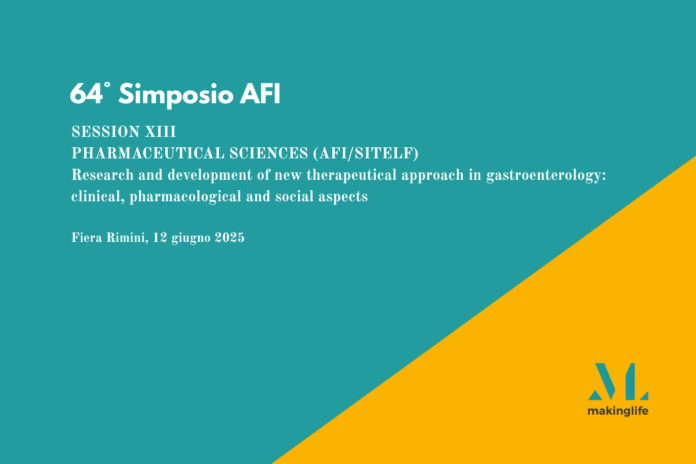Curated by Massimo Pedrani, co-organizer and speaker, the 13th session of the 2025 AFI Symposium is set to be a significant event for the scientific and industrial community engaged in the study and development of pharmaceutical sciences. The event will take place in Rimini this coming June, and as usual, the AFI is proposing a format that brings together research, clinical practice, and industry in a high-level multidisciplinary setting.
A thematic session of strategic importance
Each year, the pharmaceutical sciences section distinguishes itself with a different thematic focus, addressing the emerging needs of the scientific community and the most pressing therapeutic challenges. This year, the spotlight is on the gastroenterological area, with a particular emphasis on intestinal diseases and the most recent therapeutic strategies.
The epidemiology of gastrointestinal diseases—such as inflammatory bowel disease (IBD), ulcerative colitis, Crohn’s disease, as well as metabolic dysfunctions and issues linked to the intestinal microbiota—makes this area of study particularly crucial. The latest epidemiological data indeed indicate a rising incidence of IBD in Western and Asian populations, with a growing impact on quality of life and healthcare costs.
The value of multidisciplinarity
One of the defining elements of the session is the participation of a broad range of professionals: physicians, pharmacologists, pharmacists, academics, and industry representatives. This synergy makes it possible to tackle gastrointestinal diseases from various perspectives—an essential aspect in today’s context, characterized by rapid technological developments and the continuous updating of clinical guidelines.
Among the speakers, Massimo Pedrani highlighted the presence of prominent opinion leaders whose expertise spans the entire pharmaceutical supply chain: from academic research to clinical practice and industrial development.
Focus on emerging pathologies and therapies
The session will be divided into three main areas. The first will cover the most clinically and therapeutically relevant gastrointestinal diseases. In addition to IBD, topics will include biliary and metabolic dysfunctions, intestinal dysbiosis, irritable bowel syndrome, and chronic pancreatitis.
For example, the treatment of pancreatic diseases represents an area in which pharmacological research is making significant strides. In this regard, Massimo Latino and Marco Anelli will discuss “Pancreatic Enzyme Replacement Therapy” (PERT), a crucial therapy for patients with pancreatic insufficiency, especially those with cystic fibrosis. Both clinical aspects and regulatory implications will be explored, offering a comprehensive picture of the challenges and opportunities associated with managing this condition.
Technological innovations and galenic development
The second key aspect will be addressed by Salvatore Agostino, director of the galenics and R&D department at DMX Pharma. His talk will focus on the evolution of pharmaceutical technologies applied to gastro-resistant formulations and controlled drug release.
Galenic research is indeed a crucial element in ensuring the stability of active ingredients and optimizing gastrointestinal absorption—an essential aspect in the pharmacotherapy of digestive diseases. In an increasingly stringent regulatory environment, the challenge for pharmaceutical companies is to combine innovation, therapeutic efficacy, and economic sustainability.
Release systems and therapy personalization
The third area of focus will be presented by Anastasia Foppoli from the University of Milan, who will showcase the latest studies on controlled oral drug delivery systems. This ever-evolving technology represents one of the most promising frontiers in the treatment of gastrointestinal diseases.
The concept of “provisional oral release systems” fits perfectly within the precision medicine paradigm: the ability to personalize drug administration based on the patient’s pharmacokinetic profile and the localization of the disease in the gastrointestinal tract. Such approaches are increasingly demanded by regulatory authorities and the clinical community, aiming to improve therapeutic adherence and reduce adverse events.
A look at the current context: challenges and perspectives
The current scientific and regulatory landscape requires that gastrointestinal diseases be considered not only a strictly clinical topic but also an area of significant socio-economic relevance. The increasing prevalence of conditions such as irritable bowel syndrome and the growing attention to the role of the intestinal microbiota (and its alterations, or dysbiosis) represent challenges that call for an integrated approach.
In the post-pandemic context, there is also a growing awareness of gastrointestinal health as an integral part of overall well-being. Numerous studies have highlighted a link between gastrointestinal disorders and chronic stress, opening new scenarios in understanding the role of the gut-brain axis in the genesis and management of digestive diseases.
Conclusions and expectations for the Symposium
The 13th session of the 2025 AFI Symposium thus fits into a rapidly evolving landscape where collaboration between academia, clinical practice, and industry is essential to developing safe and effective therapeutic solutions. The decision to focus on gastrointestinal diseases reflects a concrete and timely need, offering participants the opportunity to stay updated on the latest innovations and to engage with international experts.
As Massimo Pedrani emphasized, the session is not only a moment of training and professional development but also an opportunity for networking among professionals with different yet complementary skills. A necessary dialogue to tackle current challenges and to project research and clinical practice towards an increasingly integrated and innovative future.


